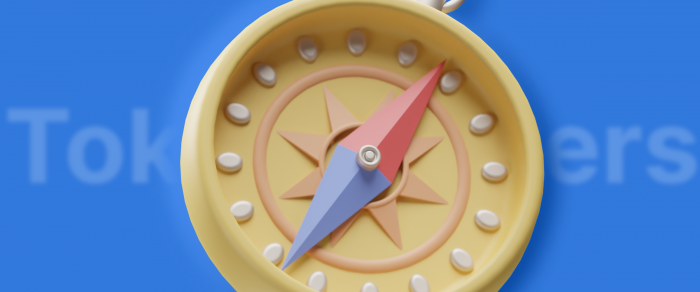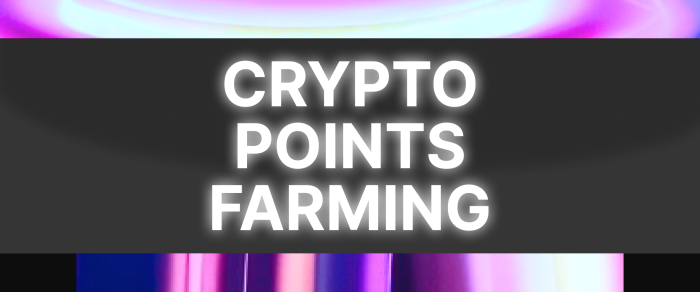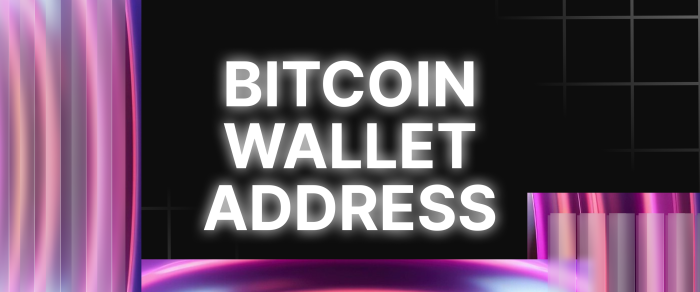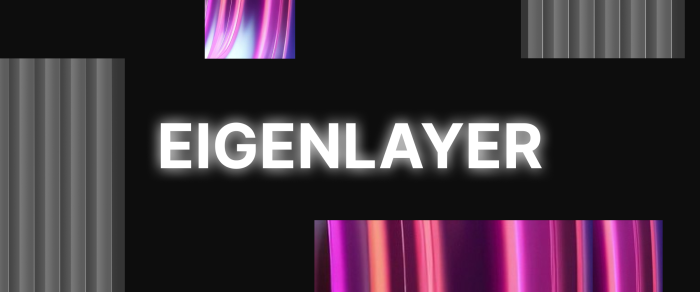Exploring Token Makers: What Are They and How Do They Work?
A token maker is a powerful tool that allows basically anyone to create tokens on blockchains. It offers the convenience of easily creating your own tokens without having to have any programming knowledge or coding skills. Token makers are becoming increasingly popular and provide an effective way for businesses, entrepreneurs, developers, and users to make use of blockchain technology in their applications.
Key Takeaways:
- Tokenization involves breaking down the asset into smaller units, creating a digital record for each unit, and leveraging smart contracts to define token characteristics such as ownership rights and supply.
- Token makers provide an easy way for anyone to create tokens on blockchains, eliminating the need for programming skills and providing a convenient bridge between cryptocurrency and the mass market.
- Creating tokens with a token maker is a streamlined and user-friendly process involving customizing parameters, generating smart contracts, testing the setup, deploying to the blockchain and distributing tokens.
- Utility tokens, security tokens, non-fungible tokens (NFTs), and payment tokens are the types of tokens that can be created using a token maker.
What Is a Token?
Digital tokens are an important part of the cryptocurrency landscape. They are digital representations of valuable assets or forms of ownership, held and tracked securely on a blockchain ledger system – which is decentralized and transparent.
By leveraging cryptographic principles and sophisticated algorithms, blockchain ensures the immutability and integrity of token transactions. Each token holds a unique identifier that distinguishes it from others, allowing for seamless traceability and accountability. Additionally, smart contracts embedded within the blockchain can automate the execution of token-related actions, providing a trustless and efficient environment for the exchange of value.
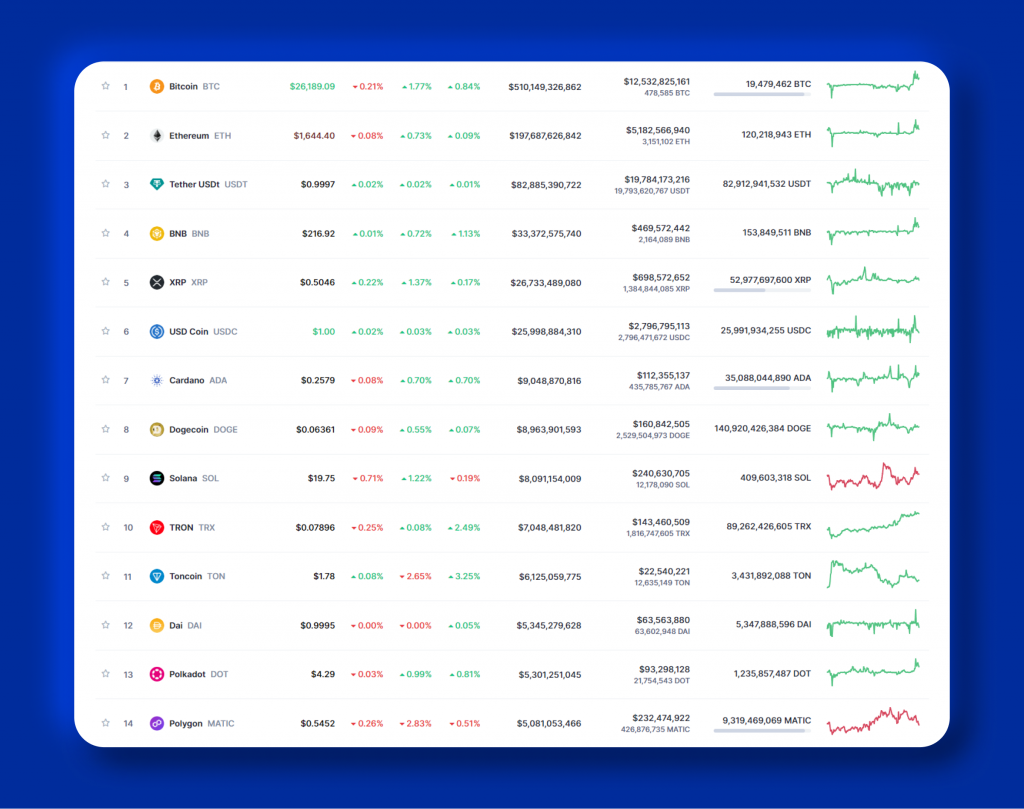
Let’s look at an example:
A real estate investment firm can tokenize a portfolio of properties and sell the tokens to investors. The resulting tokens would represent the ownership stakes in the underlying asset and could be used for trading, speculation or other purposes.
In this case, tokenization helps to reduce inconvenience by allowing investors to access portfolios with small amounts of capital and quickly trade their digital assets in a secure and transparent manner.
With the rising popularity of tokenization, industries ranging from finance to gaming are exploring the potential of these digital assets. Tokens can represent traditional assets like real estate or stocks, as well as novel concepts like digital collectables or virtual currencies within online ecosystems. The versatility and flexibility of tokens offer endless possibilities for innovation and disruption across multiple sectors.
How Does Tokenization Work?
Tokenization involves breaking down the asset into smaller units and creating a digital record for each unit. As already said, it can be used to represent almost anything, such as physical assets (like real estate or stocks), digital assets (like music or gaming items) or even intangible concepts (such as voting rights).
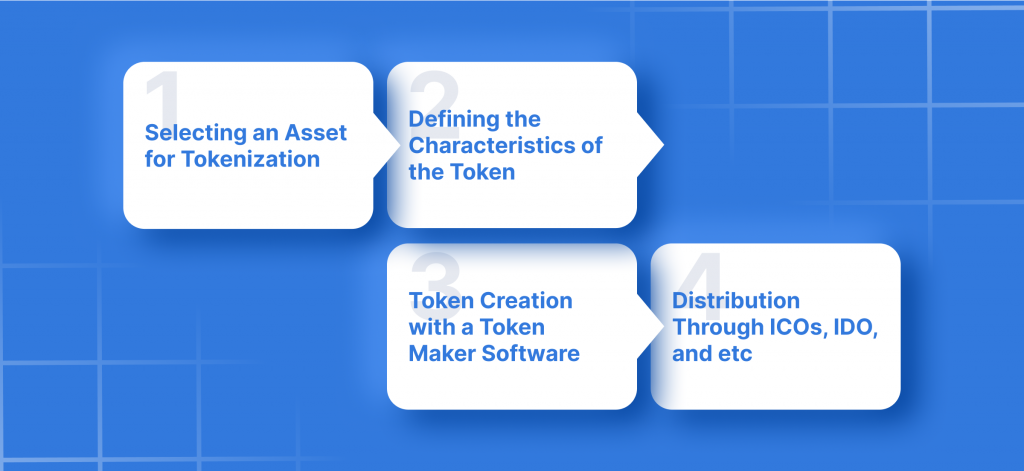
What Does Tokenization Include?
Tokenization is a hot topic with the potential to revolutionize the global economy. Let’s examine the intricate steps of tokenizing an asset:
Selecting an Asset
Tokenization begins with selecting the asset to tokenize. This can include a wide range of options such as real estate properties, artwork, shares in the project, or even intangible assets like intellectual property. However, amidst this process, it is crucial to prioritize legal compliance, as different jurisdictions have varying laws and regulations surrounding asset tokenization.
Designing a Token
Token design plays a significant role in the process – it involves defining the characteristics of the token itself. This includes aspects such as ownership or usage rights, as well as determining token supply and other related parameters.
Smart contracts play a crucial role in the process. They are automated pieces of code on the blockchain that can be used to trigger certain actions when predetermined conditions are met.
Token Creation
The next step is token creation. This phase requires the involvement of developers or token-issuing platforms with user-friendly interfaces that can assist users in generating and deploying tokens. That’s also where token makers come into play.
Distribution
Once created, tokens can then be distributed through ICOs, IDOs or any other form of allocation mechanism. This is followed by secondary market trading, where users can trade their tokens on digital exchanges, much like traditional stock markets but hosted online.
What is a Token Maker?
Token makers are advanced tools that introduce a higher degree of automation to the process of creating tokens. They enable individuals with a knack for cryptocurrencies to easily mint digital assets. These platforms simplify token development by supporting various standards like ERC-20 and BRC-20 and even provide the capability to create both fungible and non-fungible tokens (NFTs).
Thanks to token makers, high-level blockchain programming skills are no longer a prerequisite for creating and launching new cryptocurrencies. With its presence, it is now easier to bridge the gap between cryptocurrencies and the mass market.
The Capabilities of Token Generators
Token makers offer the ability to control various parameters of a given token, providing flexibility and customization options. For example, users can easily manage the total supply, divisibility, and specific use cases for the tokens of tokens and even revoke them if needed. Tokens can thus be tailored to fit a variety of specific purposes.
Moreover, token makers provide a crucial function to their users – smart contract automation. By leveraging token makers, users can save time and effort when developing and deploying smart contracts. These automated contracts ensure the secure and transparent execution of token transactions.
These platforms also handle the complexities of coding and deploying smart contracts, making it easier for developers to create tokens quickly and efficiently.
Platforms like this usually utilize an advanced entropy source to ensure the highest level of security for the generated tokens. This guarantees that the tokens are genuinely random and unpredictable, rendering them virtually invulnerable to any malicious actors attempting to exploit vulnerabilities.
An entropy source is basically a computer input device that supplies random bits, increasing the difficulty level intruders need to face when attempting to access unauthorized information. It serves as an additional layer of protection for the generated tokens, making them harder to crack and, therefore, more secure.
How Do Token Makers Work?
Creating tokens can be a complex process, as developers need to understand how to write code that is compatible with their chosen protocol.
For example, creating an ERC-20 token on the Ethereum blockchain requires programmers to determine the unique specifications of the token, code its smart contract, test it and verify its source code. This could take hours, days or more – especially for those who are not highly skilled in coding.
Fortunately, token generators provide users with an automated drag-and-drop function that eliminates the barriers to tokenization and considerably shortens the amount of time it takes to create a new token.
By connecting a cryptocurrency wallet to the app, users can start creating their tokens on their chosen blockchain in just 10 minutes. Features such as defining the token’s name and supply, as well as adding features for minting and burning, are easy to add via simple steps within such an application.
Token makers can also be used after the initial token creation process to modify existing tokens so that developers can tailor their tokens to meet their needs. This is especially useful for those seeking to launch an Initial Coin Offering (ICO) or Security Token Offering (STO).
Token Creation with a Token Maker
Using a token maker to create tokens is a streamlined and user-friendly process that involves following a series of steps.
Step 1: Select a Platform
To create your own token, the first step is selecting a suitable token maker platform. Numerous token makers are available, each offering a variety of features and functionalities.
CoinTool
This token generator tool combines the advantages of Ethereum-based smart contracts and the modern infrastructure development toolchain. It features an intuitive graphical user interface and allows users to generate tokens within minutes.
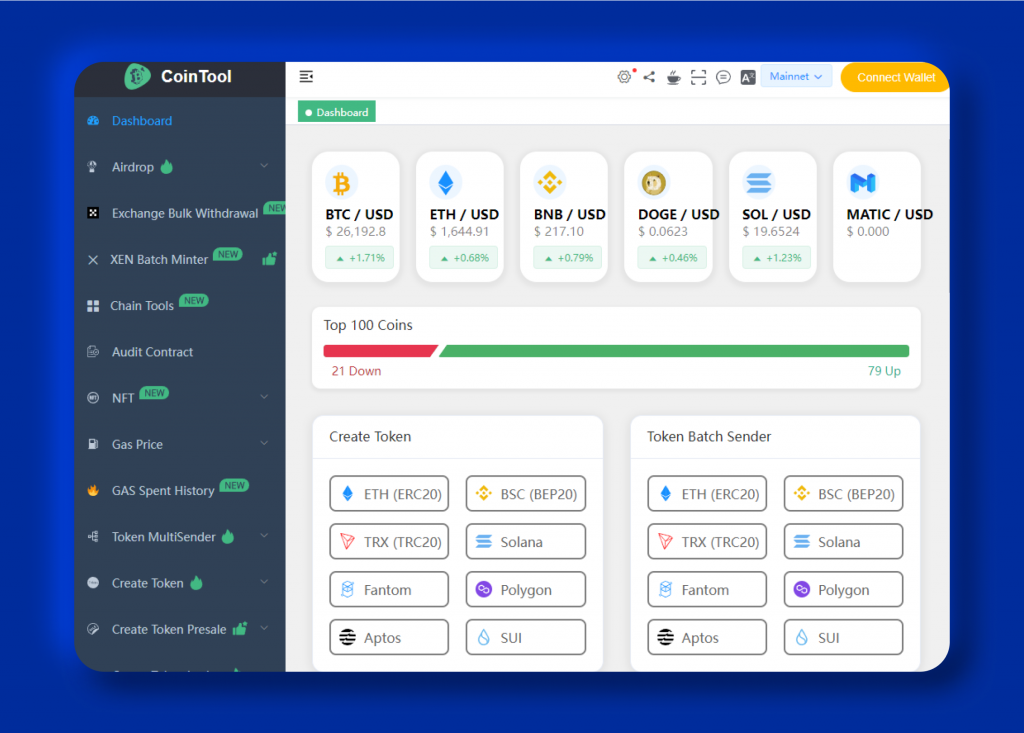
Create My Token
This is another reputable token maker platform that provides a simplified process for tokenization and creation of fully functional tokens on BEP-20 and ERC-20. With just a few simple steps, users can connect their MetaMask wallet, customize their token’s details and features, and deploy it.
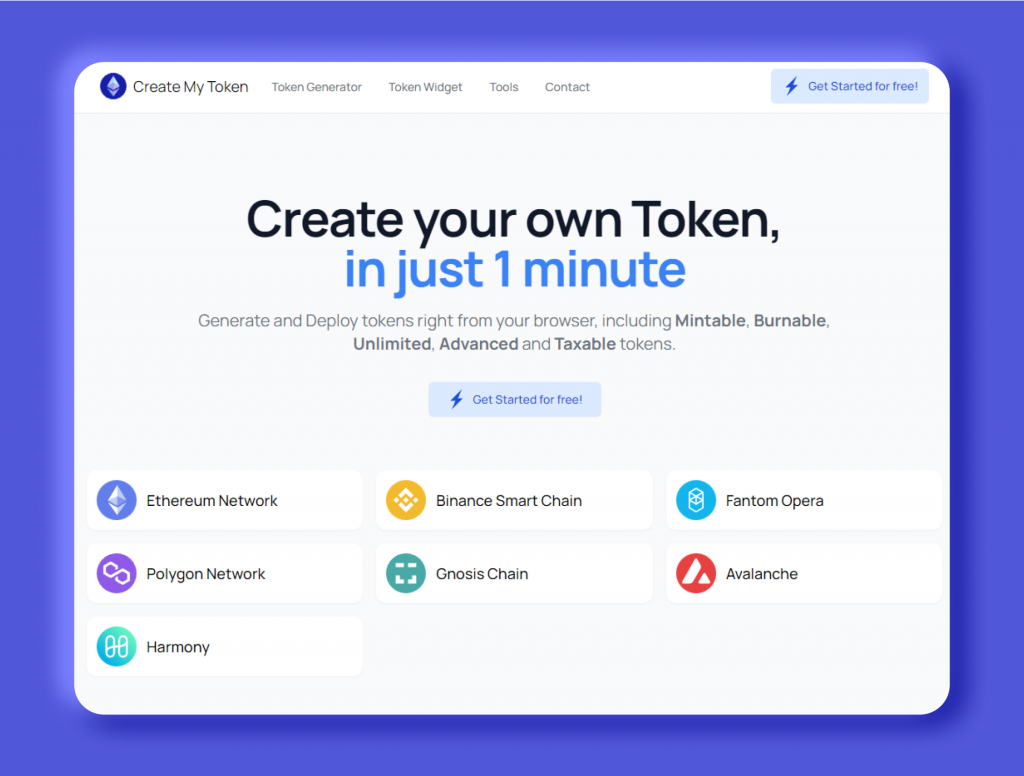
TokenMint
This platform enables users to create their own unique tokens effortlessly. Alongside its user-friendly interface, the platform prioritizes privacy and security. To access the generator, simply download the Cobalt wallet and fund it with Horizen (ZEN) cryptocurrency to cover no-code token generation fees.
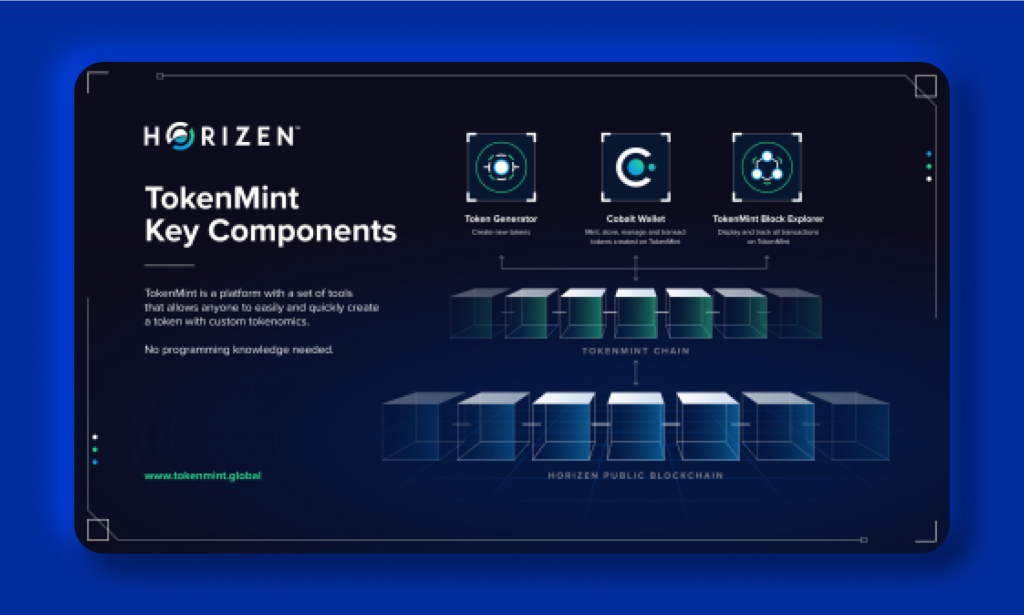
Step 2: Sign Up
After selecting a token maker, proceed by creating an account on the platform and supplying all the required information. This step holds utmost importance, as it empowers the token maker to efficiently process your request and generate the necessary smart contracts.
Step 3: Select Token Type
It’s crucial to determine the type of token you desire to create. There are various choices available, such as utility tokens, security tokens, non-fungible tokens (NFTs), and more. Each option possesses distinct qualities that make it stand out in its own way.
Step 4: Customize
The fourth step involves personalizing your token’s parameters. This includes providing a unique name, symbol, total supply of tokens, and other essential attributes. This information is crucial for the platform to accurately generate the smart contract tailored specifically to your needs.
Step 5: Smart Contract Generation
The token maker platform will generate the required smart contracts based on the information provided in Step 4. This crucial step entails configuring the essential parameters of the smart contract, such as transaction fees and limitations.
Step 6: Test
When accessible, make the most of the testing environment to simulate token creation and transactions. This allows you to detect any potential errors or bugs in the smart contract that require attention.
Step 7: Deploy
After ensuring the setup meets your satisfaction and conducting thorough testing, it’s time to deploy the smart contract onto your selected blockchain. This pivotal step will unlock the ability to initiate token creation and distribution, setting your project in motion.
Step 8: Distribution
This final step involves distributing tokens to users or investors. Depending on the token type, these could include airdrops, Initial Coin Offerings (ICOs), security token offerings (STOs), and more.
What Types of Tokens Can Be Created?
The types of tokens that can be created depend on the functionality they provide.
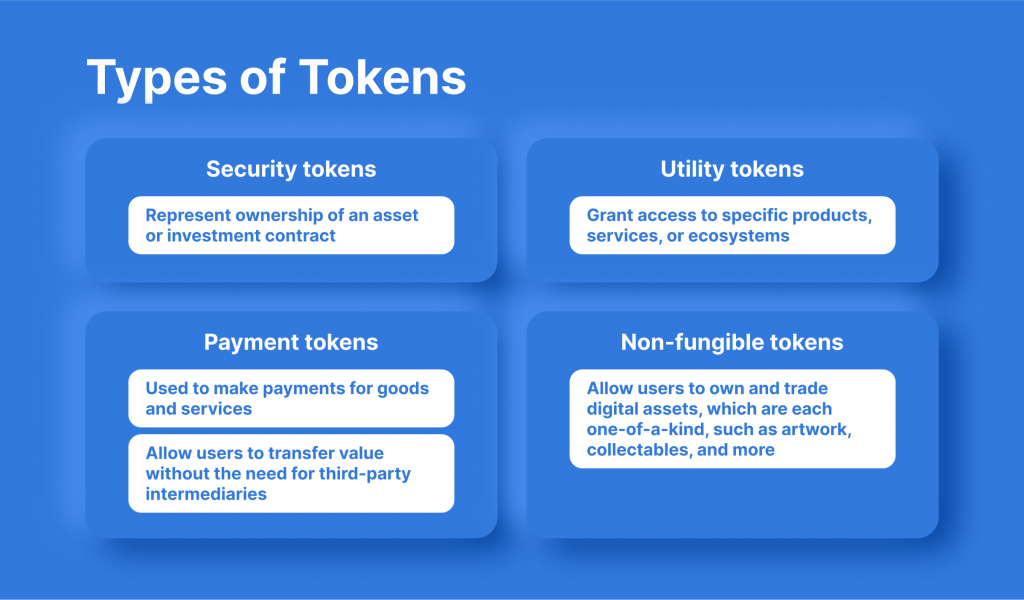
One category is utility tokens. These tokens hold the power to grant access to specific products, services, or ecosystems. They are often utilized to give users the ability to exchange cryptocurrency for goods and services, be it on an existing platform or a new one.
Security tokens, also known as digital assets, are tokens which represent ownership of an asset or investment contract. These could be anything from real estate to stocks and bonds, all stored in the form of a digital token. Security tokens give users the ability to invest in and potentially benefit from future returns on their investments.
Non-fungible tokens (NFTs) are also becoming increasingly popular due to their unique properties. These tokens allow users to own and trade digital assets, which are each one-of-a-kind, such as artwork, trading cards, collectables, game assets, and more. Even though NFTs are based on blockchain technology, similar to other tokens, they cannot be exchanged like a fungible currency or commodity due to their unique attributes.
Finally, payment tokens are tokens which are used to make payments for goods and services. These allow users to transfer value without the need for third-party intermediaries, eliminating hefty fees associated with traditional payment methods. Additionally, these transactions also take place in a matter of minutes or even seconds.
Conclusion
Token makers play a crucial and indispensable role in democratizing tokenization, opening it up to users and businesses of all backgrounds, even those without extensive technical knowledge. By simplifying the process and providing user-friendly interfaces, token makers empower a wider audience to participate in the world of blockchain technology and digital assets. Their efforts bridge the gap between complexity and usability, enabling seamless integration and adoption of tokenization for diverse use cases.
FAQ
What are the pros and cons of token makers?
The pros of using token makers are that they allow users to customize their tokens with attributes and create a unique identifier for each user. Token makers also provide enhanced security as the tokens are cryptographically secured. Additionally, token makers can be used to automate identity management processes more efficiently.
On the other hand, there are some drawbacks to using token makers, such as increased costs associated with setup and ongoing infrastructure requirements. Additionally, token makers may impose limitations on the types of tokens that can be generated, which could limit flexibility or features.
How is token-making different from other methods of creating tokens?
Token makers differ from other identity management software solutions in a few key ways. Token-making is typically an automated process that can generate unique tokens quickly and easily without the need for manual input or intervention. Additionally, token makers typically use cryptographic hashes to authenticate user identities and encrypt data, which provides enhanced security compared to traditional methods of data management.
Are there any fees associated with using a token maker?
Yes, most token makers require users to deposit a certain amount of cryptocurrency in order to cover the cost of generating the smart contract. Additionally, some may also charge fees for additional features and services. Always make sure you are aware of any associated costs before proceeding.
